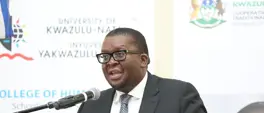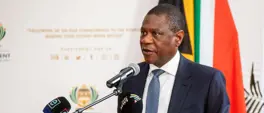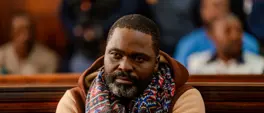REBONE TAU: Higher education minister’s engaging approach could rescue NSFAS and SA’s academic youth
Rebone Tau
19 September 2024 | 7:51It is not common to see the Minister of Higher Education engaging with students before NSFAS launches its online application process. But Nobuhle Nkabane is changing how stakeholders, most importantly students, are affected by NSFAS, writes Rebone Tau.
The appointment of Dr. Nobuhle Nkabane as the Minister of Higher Education and Training is a good one.
President Cyril Ramaphosa has applied meritocracy when it comes to this Ministry and it is encouraging to see young people who have capacity deployed to key positions. Nkabana is a scholar and young. She has acquired her qualifications during the post-apartheid period and therefore has a sense of the challenges that scholars face when it comes to funding education.
Last week, from 12 September 2024, the minister held extensive consultations as she prepared to launch the National Student Financial Aid Scheme (NSFAS) online applications for the 2025 academic year.
Some stakeholders she held consultations with include the Democratic Alliance Students Organisation (DASO), ActionSA Student Chapter, Progressive Youth Alliance (PYA), uMkhonto weSizwe (MK) Party Student Wing, the Economic Freedom Fighters Student Chapter (EFFSC), and the Pan African Student Movement of Azania.
In the past, it was not common to see the Minister of Higher Education engaging with students before NSFAS launched its online application process.
This is amid challenges NSFAS has experienced in the past that have affected students negatively, such as delays in payments of student allowances and inefficiencies in its systems. Such an initiative by Nkabane is commendable because it shows she is hands-on, and believes in working closely with stakeholders to resolve the challenges that have affected students in the past.
These consultations also involved vice-chancellors of higher education institutions - an important inclusion as there are tensions between universities and students.
In some cases, such tensions result in street demonstrations by the students, disrupting classes and university programmes.
However, we can’t build a country through demonstrations, but we can build it through robust and frank engagements and finding solutions that can take the nation forward. And ultimately, an approach based on engagements is more likely to produce young people who will contribute towards building the economy of this country.
Nelson Mandela once said, “Education is the great engine of personal development. It is through education that the daughter of a peasant can become a doctor, that the son of a mine worker can become the head of the mine, that a child of farmworkers can become the president of a great nation," and this is something Nkabane seems to understand well.
And while Rome can’t be built in a day, she is heading in the right direction by forming a healthy relationship with students, many of whom depend on NSFAS.
In trying to work towards meeting the high demand of students going into the 2025 academic year, the Minister indicated that one of the reasons for postponing the launch of the 2025 NSFAS online application process was to allow time for a dry run of the online application system to stakeholders - another progressive move by the Department of Higher Education as it allows students and other stakeholders to understand the system better and make inputs.
This input is crucial, as they are the ones facing challenges daily.
We want to see Ministers who are accessible to stakeholders to avoid conflicts among the role players. We want people to find solutions that will take the country forward. We don’t want to see arrogant ministers who don’t engage with stakeholders and just do things because they think they know and have all the answers to problems that face South Africa.
The government has set ambitious targets of one million enrolments in community colleges, 2.5 million enrolments in public and private TVET colleges, and 1.6 million enrolments in universities by 2030. This to help address the skills deficit in South Africa which is a major feature of our high unemployment rate, especially among young people.
According to Statistics South Africa, the unemployment rate among graduates was 9.7% in the second quarter of 2024, compared to 35.8% for those with matric only, and 39.3% for those with less than matric. Empowering more youths with higher education and training will therefore help bring down the unemployment rate in the long run.
However, the government cannot meet these targets without a collaborative approach with all the stakeholders in the post-school education and training (PSET) sector. It is therefore encouraging that the minister has embraced collaboration very early in her tenure.
Nkabane has also indicated that her consultations will be ongoing and will shape the future of higher education policy, especially around student access to financial aid. Her consultative approach therefore sets the tone for the new NSFAS board that is being reconstituted.
The online application process is only the first step. The second and more difficult step will come when students register at higher education institutions next year. The incoming board must continue with this consultative approach to avoid the administrative challenges NSFAS faced at the beginning of 2024.
It is also clear that beyond NSFAS, the minister is equally focused on broader issues in the PSET sector, including expanding the TVET college sector, aligning the country’s skills needs with the curriculum content, and reviewing some legislation and policies governing the sector. This indicates she has both tactical and long-term strategic vision for the sector.
One hopes that all PSET stakeholders, as well as political formations and South Africans in general, will accord Nkabane and the department the necessary support as she works to advance our higher education and training goals.
If the department and the sector succeed, South Africa will also succeed in the medium to long term.
Rebone Tau is a political commentator, and author of 'The Rise and Fall of the ANC Youth League'.
Get the whole picture 💡
Take a look at the topic timeline for all related articles.















